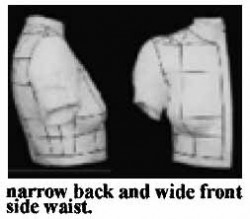Marc Abrahams's Blog, page 605
January 18, 2012
Classification of Tight-Fitting Bodices (F & M)
 Professor Haruki Imaoka (Faculty of Education, Mie University, Japan) and professor Tomoe Masuda (Faculty of Human Life and Environment, Nara Women's University, Japan) have, between them, created a Classification of Tight-Fitting Bodice Patterns of Young Women Using Concentrated Gaussian Curvature. The details are presented in the journal Sen'i Gakkaishi, Vol. 60 (2004) , No. 12, p. 377 (a publication of the Society of Fiber Science and Technology, Japan.)
Professor Haruki Imaoka (Faculty of Education, Mie University, Japan) and professor Tomoe Masuda (Faculty of Human Life and Environment, Nara Women's University, Japan) have, between them, created a Classification of Tight-Fitting Bodice Patterns of Young Women Using Concentrated Gaussian Curvature. The details are presented in the journal Sen'i Gakkaishi, Vol. 60 (2004) , No. 12, p. 377 (a publication of the Society of Fiber Science and Technology, Japan.)
And, as promised in the article, just a year later, they followed up with Classification of Curved Shapes for Tight-Fitting Bodice Patterns of Young Men Using Concentrated Gaussian Curvature

Upgrading Your Ultrasound System [video]
Investigator Richard Rae made this short video, which we present with only his comment:
If you're a sonographer or vascular technologist, this short video demonstrates a guaranteed successful approach to ensuring that your administrators and managers will find a way to replace your aging or obsolete system.

January 17, 2012
Exciting video: Sample Size
This is the most exciting video you will have seen during the minute and 59 seconds you were watching it. It's specially made for market researchers. It's about sample size. It's from Oxford University Press. It's right here:

After watching the video, you may still be in want of excitement.
BONUS: All about the star: Nigel Bradley
BONUS: The source of the video

Kathryn Devaney joins LFHCfS
Kathryn Devaney has joined the Luxuriant Flowing Hair Club for Scientists (LFHCfS). Yakov Kronrod, who nominated her, says:
Whether studying long-haired monkeys in Belgium or putting long-haired people in fMRI scanners in Massachusetts, Kathryn's devotion to luxurious hair studies has been extraordinary. Recent publications include "Scene-selective cortical areas in human and non-human primates" and "Lower-level stimulus features strongly influence response in the Fusiform Face Area."
Kathryn Devaney, LFHCfS
Research Assistant
Martinos Center at MGH
Harvard Medical School
Charlestown, Massachusetts, USA


January 16, 2012
The ubiquity of dead mules in Southern literature
 Jerry Leath Mills [pictured here] reigns as the unchallenged authority on the subject of dead mules in 20th-century American southern literature.
Jerry Leath Mills [pictured here] reigns as the unchallenged authority on the subject of dead mules in 20th-century American southern literature.
Professor Mills established his reputation – almost instantly – in 1996, with the publication of a long essay called "Equine Gothic: The Dead Mule as Generic Signifier in Southern Literature of the Twentieth Century".
He retired that year after three decades of teaching English at the University of North Carolina at Chapel Hill. His dead mule treatise appeared in The Southern Literary Journal. "Equine Gothic" reads as if the accumulated dead mules had been stewing in Mills's head, and were at last in a fit state for him to ladle out….
So begins this week's Improbable Research column in The Guardian.
BONUS: A related-in-spirit web site called "The Dead Mule School of Southern Literature"

A multi-level documentary about Melbourne
The documentary film "This is Melbourne… Wow!", by Cameron Cairns, presents information about a city called Melbourne, which is in Australia. The information is presented on two levels.
(HT Carl Pilber)
BONUS: "Away From It All"

A new standard way to measure the threshold of personal tragedy
Some skilled psychologists see big consequences aborning in seemingly trivial things. Here's an example.
This particular seemingly trivial thing happens — or doesn't happen — at online dating sites. The researchers describe it in a quick phrase: "as indicated by fewer first visits to their dating profiles".
This is big: a newly-recognized threshold for assessing personal tragedy. Yet, the researchers who devised it did so modestly — they did not call special attention to it. They simply used it as the crux of their new study:
"Unfortunate First Names: Effects of Name-Based Relational Devaluation and Interpersonal Neglect," Jochen E. Gebauer [pictured here], Mark R. Leary and Wiebke Neberich, Social Psychological and Personality Science, epub December 22, 2011. The study says [though it does not highlight the important phrases, as we do here]:
"Can negative first names cause interpersonal neglect? Study 1 compared extremely negatively named online-daters with extremely positively named online-daters. Study 2 compared less extreme groups—namely, online-daters with somewhat unattractive versus somewhat attractive first names. Study 3 compared online-daters with currently popular versus currently less popular first names, while controlling for name-popularity at birth. Across all studies, negatively named individuals were more neglected by other online-daters, as indicated by fewer first visits to their dating profiles."
The researchers then explain the implications:
"This form of neglect arguably mirrors a name-based life history of neglect, discrimination, prejudice, or even ostracism. Supporting this argument, neglect mediated the relation between negative names and lower self-esteem, more frequent smoking, and less education. These results are consistent with the name-based interpersonal neglect hypothesis: Negative names evoke negative interpersonal reactions, which in turn influence people's life outcomes for the worse."
(Thanks to investigator Scott Langill for bringing this to our attention.)
 BONUS: Study co-author Wiebke Neberich [pictured here, in a photo on the eDarling site] is the new spokesperson for the online dating site eDarling.
BONUS: Study co-author Wiebke Neberich [pictured here, in a photo on the eDarling site] is the new spokesperson for the online dating site eDarling.
BONUS: The New York Daily News celebrates the implications of the study, in a newspaper article called "".
BONUS: Read more about Wiebke Neberich's research for eDarling in this report in Best Dentists: "Single smokers have increased sexual desire"

Erlich's bullet point: Sniff
Robb Dunn confides a muttered aside made to him years ago by Paul Erlich:
The specific one liner I am talking about here is one I heard when Ehrlich visited North Carolina State University, where I work. I was helping to host his visit and he and I were talking at the back of a large conference room. We were both looking at the backs of a crowd of hundreds gathered in front of us and, of all things, discussing back pain. We agreed—back pain is terrible. He told me to take care of my back and then, as he looked to the audience and stepped forward through the crowd to give his talk, he left me with a sentence somewhere between punch line and universal truth…" back problems all started when we began walking upright. The other bad thing about walking upright is that it made it hard to sniff each other…" With that, he strode, upright, to the stage and began to speak.
Sometimes, when I think of Paul Ehrlich, I think of people sniffing each other. And as several new studies reveal, when it comes to sniffing each other, men are like dogs. Women are too….
This, and much more that's to the point of the aside, are in Dunn's essay called "Why dogs sniff dogs, humans sniff humans, and dogs sometimes sniff humans", for Scientific American.
BONUS: The other Paul Erlich, he of the magic bullet:

January 15, 2012
A documentary of documentaries (Monty Python)
This documentary film, called "Away From It All", was shown in movie theaters in Britain immediately preceding the Monty Python film "Life of Brian". In just 12 minutes, it visits a large number of topics and places.
If you watch just one documentary film this year, it will almost certainly remind you of this one (if you have watched this one):
(HT Steve Colgyn)

'The three faces of Bill' (and Ickes on rudeness)
 William Ickes is Distinguished Professor of Psychology at The University of Texas at Arlington, US, and is an expert on empathic accuracy, intersubjective social cognition, and unstructured dyadic interaction paradigms.
William Ickes is Distinguished Professor of Psychology at The University of Texas at Arlington, US, and is an expert on empathic accuracy, intersubjective social cognition, and unstructured dyadic interaction paradigms.
The university faculty publishes, via their website, some curious photographs (reproduced here, below) of the professor, under the heading: 'The three faces of Bill' (link found via this page)
But no explanation is offered. Can any readers enlighten us?
Recent publications :
F#!% Rudeness: Predicting the Propensity to Verbally Abuse Strangers ,William Ickes, Anna Park, and Rebecca L. Robinson, Journal of Language and Social Psychology November 21, 2011. The authors say:
The results of multiple regression analyses revealed a number of significant main effects. These effects revealed that the people in the authors' sample who reported the greatest propensity to verbally abuse strangers were Hispanic/Latino or Black individuals who scored low in adherence to the standards of conventional morality but high in ego defensiveness (unwillingness to accept criticism or correction from others) and affect intensity for anger and frustration. The authors' interpretation of the findings combines insights derived from Swann's self-verification theory, contrasting views of ego defensiveness, and Larsen et al.'s work on affect intensity with a dispositional view of verbal rudeness that emphasizes its use as a weapon in interpersonal struggles for power, status, and "face."

Marc Abrahams's Blog
- Marc Abrahams's profile
- 14 followers
























